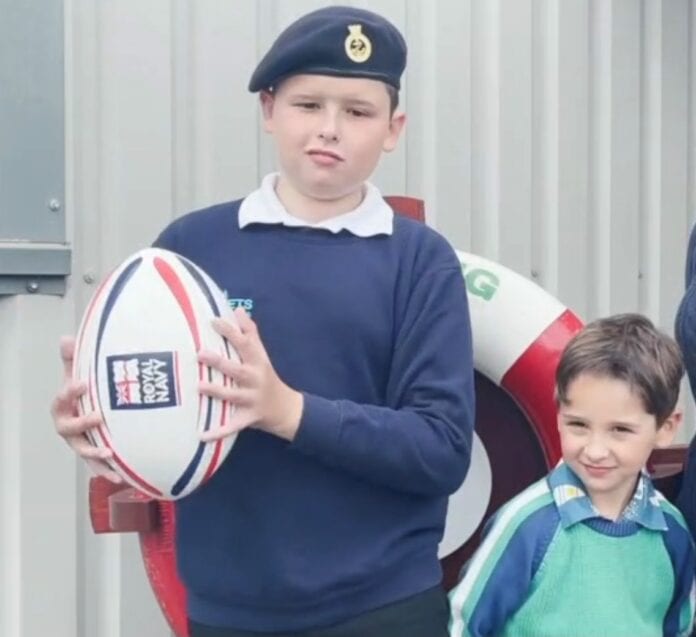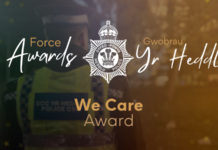Sea Cadets in Neath (South Wales), Barnsley and Doncaster (South Yorkshire) have recently saved the lives of other children and young people
When a young person joins Sea Cadets, they not only learn to be more resilient, confident, self-disciplined and perform better at school – they are also learn how to save lives.
There have been numerous examples of cadets putting the first aid skills they learn at Sea Cadets to excellent use in the last few months:
Caption: Cai from Neath recently saved his younger brother’s life when he was choking on some bacon.
At the tender age of 11, Cai, a Welsh cadet from the Neath and District Sea Cadet Unit, had the cool-headedness to save his young brother’s life when he was choking on a bacon sandwich.
Cai said, “I could see Ioan was choking and starting to turn blue and so I gave him a hard slap on the back to clear his airway. I’m so glad that I knew what to do and was able to help my brother.”
Cai was able to rescue his brother thanks to First Aid training sessions delivered on Zoom by his local Sea Cadet unit during lockdown.
His mother, Daniella, who was a Sea Cadet herself, commented, “We are so proud of Cai’s quick thinking. He remained calm and knew exactly what he needed to do to help his brother.
“He has only just turned 11 and was just 10 when this happened a few weeks ago, so it really is amazing that he was able to react so quickly and calmly in a very scary situation. This underlines why it is so important for children to have an understanding of first aid. We are very grateful that Cai had received this training.”
Cai’s Commanding Officer, Sub Lieutenant Chloe Oglesby, said, “I am very proud of Cai. He reacted in a way that many people would not be able to, resulting in his brother’s life being saved. It really does go to show that learning basic life-saving skills at a young age…really can make a huge difference to someone’s life.”
Caption: Keya from Barnsley rushed to the aid of a young boy at a skate park when he fell of a scooter and cracked his head open, bleeding profusely.
Another young cadet from Barnsley, Keya, used her first aid knowledge learnt at Sea Cadets to rush to the aid of a ten-year-old boy at a skate park when he fell of a scooter and cracked his head open.
“When I heard the boys head hit the ground and then him scream, I knew he was hurt quite badly,” said fifteen-year-old Keya. “I ran over and saw the blood coming from his head wound and knew from my cadet training that I had to apply pressure to the wound to try and control the bleeding and keep the boy calm.”
“I carry a small first aid kit in my bag and it has a bandage in it, so I used that to apply pressure. I got the boy to contact his family and stayed with him until his uncle arrived to take him to hospital. His uncle said I had done a brilliant job.”
Keya added, “I think first aid is a skill everybody should learn, knowing how to deal with a situation without panicking and keeping the casualty calm is one of the most important parts.”
“I’m very proud of Keya she has taken on board what she has been taught at cadets, and had to use her first aid skills twice now, said Keya’s mother, Leanne. “First aid should be in the school curriculum from a young age as you never know when you may need to use it.”
Barnsley Unit’s Officer in Charge, Petty Officer Neil Stubbs, said, “We are incredibly proud of Keya and the way she has taken what she has learned and applied it with good effect. For the young lad who had the accident, he is fortunate that she was there at that time and place, and that she has acted immediately to a situation that could easily have been much more serious, had she not been there.”
Jack from Doncaster, a former sea cadet also saved the life of a seven-year-old girl, Scarlett, thanks to the first aid training he received during his time at Sea Cadets.
Jack, aged 16, was on his second day on the job as a waiter at the Jazz Café in Doncaster’s town centre when he noticed a girl choking on her food. He quickly sprang into action, standing behind her and pushing the bottom of her diaphragm to force the food out of her airway.
Jack said: “I heard screaming and I ran around the corner. The grandma had her fingers down the girl’s throat. I was a sea cadet for five and a half years and I took part in multiple first aid courses, including one on choking, during my team with Sea Cadets. So, I knew that she shouldn’t put fingers down her throat because it could push it further down and cause it to be even worse.”
Jack continued. “I knew instantly I needed to get it out of her throat, so I just grabbed the little girl and started performing the Heimlich manoeuvre. Luckily on about the fourth attempt, she managed to cough it out.”
Café owner Sarah Pinkerton said: “Thank goodness he was there. A few of us are first aid trained, but you just don’t know how you will react in an emergency situation, but for him to act as calmly and coolly as he did, it was incredible. We are just so proud of him.”
The First Aid training offered to young people who are part of Sea Cadets has been aligned with qualifications of the St John Ambulance through the Army Cadet Force Association (ACFA), so all qualifications offered are externally recognised.
Modules undertaken by our cadets include bites and stings, bleeding and shock, chest pains, choking, recovery position and coping in an emergency.
For more information about Sea Cadets, visit www.sea-cadets.org
Help keep news FREE for our readers
Supporting your local community newspaper/online news outlet is crucial now more than ever. If you believe in independent journalism, then consider making a valuable contribution by making a one-time or monthly donation. We operate in rural areas where providing unbiased news can be challenging. Read More About Supporting The West Wales Chronicle

























